Others
Swachh Vayu Diwas: India’s Commitment to Clean Air
Posted On:
24 SEP 2024 3:36PM
Introduction
September 7 is celebrated as International Day of Clean Air for Blue Skies. In 2019, the United Nations General Assembly designated it the International Day of Clean Air for Blue Skies, underscoring a growing global commitment to clean air. This initiative emphasises the urgent need for ongoing efforts to improve air quality and protect human health, with this year's theme being "Invest in #CleanAirNow."
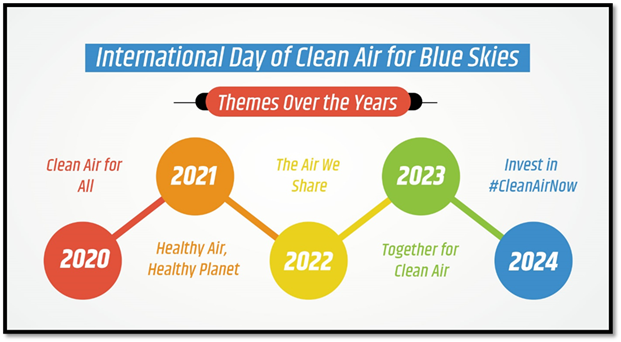
In line with this global movement, India celebrates Swachh Vayu Divas on the same day, reinforcing its dedication to addressing the critical issue of air pollution. The challenges posed by rapid urbanisation and industrialisation demand immediate and effective action due to their severe impacts on public health and the environment. The Indian government is implementing a comprehensive range of strategies, including robust legislative measures, innovative technologies, and active community participation. Through these concerted efforts, India aims to create a healthier and more sustainable future for all.
Swachh Vayu Divas 2024
The International Day of Clean Air for Blue Skies (Swachh Vayu Diwas) was celebrated on September 7, 2024, in Jaipur this year, with notable attendees including Union Minister of Environment, Forest & Climate Change, Shri Bhupender Yadav, and Shri Bhajan Lal Sharma, Chief Minister of Rajasthan.
During the celebration, it was highlighted that focused actions and effective resource convergence have resulted in positive outcomes under the National Clean Air Programme (NCAP), with air pollution levels declining in 95 cities. Remarkably, 51 of these cities under NCAP have achieved reductions in PM10 levels of over 20% compared to the baseline year of 2017-18, and 21 cities have reported reductions exceeding 40%.
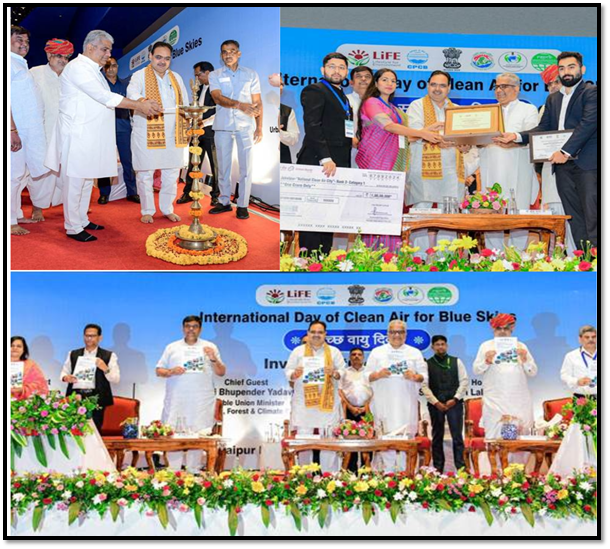
The event also included the presentation of the Swachh Vayu Survekshan Awards to the top-performing winning cities that received cash prizes, trophies, and certificates in recognition of their efforts.
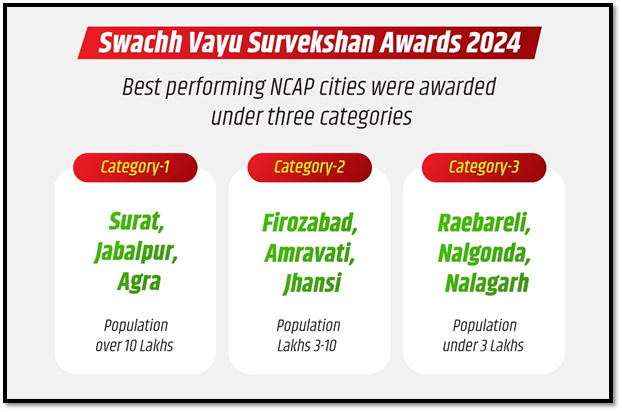
National Clean Air Programme
In a bold and ambitious move to combat one of the most pressing environmental challenges of our time, the Government of India unveiled the National Clean Air Programme (NCAP) in 2019. This flagship initiative aims to address the pervasive issue of air pollution across the country's 131 cities in 24 States by engaging all stakeholders with a strategic, long-term approach. By setting a clear target of reducing Particulate Matter (PM10) concentrations by 20-30% by 2024-25 over baseline of 2017-18. Target has been revised to achieve reduction in PM10 level up to 40% or achievement of national standards (60 µg/m3) by 2025-26.
As cities and states grapple with the escalating impacts of pollution, this program is crucial in the quest for cleaner, healthier urban environments.
- Due to efforts made under NCAP, 95 cities out of 131 cities have shown improvement in air quality in terms of annual PM10 concentrations in FY 2023-24 with respect to the baseline of FY 2017-18. 18 cities have met National Ambient Air Quality Standards (NAAQS) for PM10 (60 µg/m3) in FY 2023-24.
- MoEF&CC conducts Swachh Vayu Sarvekshan - ranking of 131 cities covered under National Clean Air Programme (NCAP) among three groups categorised based on population.
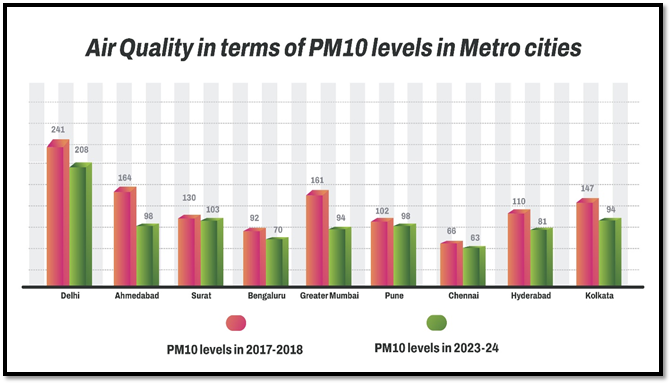
Under NCAP, an amount of Rs. 19,614.44 crores have been earmarked to 131 cities during the period FY 2019-20 till FY 2025-26 out of which 49 Million Plus Cities/Urban Agglomerations are funded under XVth Finance Commission air quality grant and remaining 82 cities are funded by MoEF&CC under Control of Pollution Scheme. So far, an amount of Rs. 11,211.13 crores have been released to 131 cities to implement City Action Plans in their respective cities. To address higher air pollution levels due to low winds and cooler temperature during winter, all 131 cities have prepared Emergency Response Plan/Graded Response Action Plan.
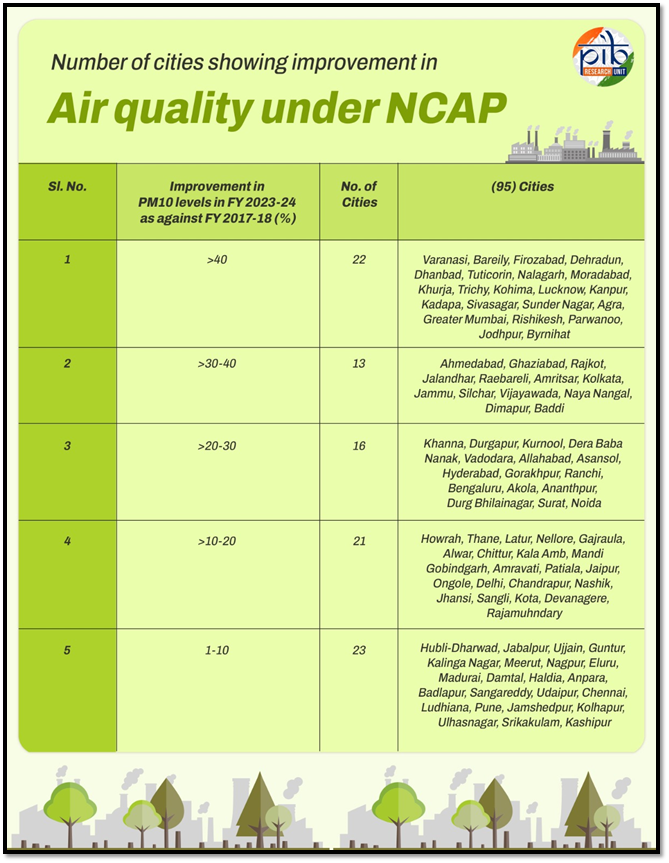
Implementation of NCAP
- “PRANA” – the Portal for Regulation of Air Pollution in Non-Attainment Cities – is designed to monitor the implementation of the National Clean Air Programme (NCAP). This portal will support tracking both the physical and financial status of city air action plan implementation and disseminate information about air quality management efforts under NCAP to the public.
- Information related to various activities and their progress under NCAP by different stakeholders will be available on this portal, which will aid in future policy decisions.
- City Action Plans (CAPs) have been prepared by all 131 cities and being implemented by Urban Local Bodies.
- The city specific clean air action plans prepared under NCAP target city specific air polluting sources like Soil & Road Dust, Vehicles, Domestic Fuel, MSW Burning, Construction Material and Industries.
- Performance based financial support is provided to these 131 cities for implementation of activities of City Action Plan.
- Further, funding for implementation of CAPs is mobilised through convergence of resources from various schemes of Central Government such as Swachh Bharat Mission SBM (Urban), Atal Mission for Rejuvenation and Urban Transformation (AMRUT), Smart City Mission, Sustainable Alternative towards Affordable Transportation (SATAT), Faster Adoption and Manufacturing of Hybrid and Electric Vehicles (FAMEII), Nagar Van Yojna, etc. and resources from State/UT Governments and its agencies such as Municipal Corporation, Urban Development authorities and Industrial development authorities etc.
- Public Grievance Redressal Portal (PGRP)/helpline have been developed by all 131 cities to address public complaints of air pollution in timely manner.
- Emergency Response System (ERS/ GRAP) have been developed by all 131cities for taking action in air emergencies.
- Ambient air quality monitoring network has 1510 stations (545 Real time stations (CAAQMS) and 965 Manual Stations (NAMP), covering 543 cities in 28 states and 7 UTs across the country.
NCAP: A Convergence for Clean Air
Swachh Bharat Mission (SBM) activities undertaken under in respect of NCAP and other cities
- Development and effective implementation of SOPs for dust mitigation in Construction and Demolition operations.
- Introducing mechanical sweepers, dust suppressants, water sprinkling system.
- Greening of open spaces and Street sides.
- Include air quality management rules in building by laws.
- Enforcement of Solid Waste Management rules.
- Control of plastic burning and open burning of waste.
- Implementation of biogas/ bio-methanation plants for managing organic wastes.
- Awareness programmes in community, college/ universities through NCC/ NSS/ NYK, etc.
- Management of legacy Municipal Solid Waste.
Activities undertaken by Ministry of Housing and Urban Affairs (MoHUA) for Urban Transport
- MoHUA supplements the efforts of the States by extending central assistance in implementing metro rail projects in cities subject to availability of budgetary resources and feasibility of proposals. Gol has issued National Urban Transport Policy in 2006 and Metro Rail Policy in 2017.
- Standards for MetroLite (suitable for PHPDT upto 15000) and MetroNeo (suitable for PHPDT upto 8000) systems have been issued by MoHUA in July, 2019 and November, 2020 respectively. These systems would address further the requirement of environment friendly public transport for Tier- 2 cities and peripheral areas of Tier-1 cities with same experience and ease of travel in terms of comfort, convenience, safety, punctuality & environment-friendly as that of conventional metro system at much lesser cost.
- MoHUA as per budget announcement 2021 has initiated the process of launching a new Scheme to augment bus based public transport in 102 cities [5 lakh plus population including hilly/ UT/ North East, State Capital cities].
Activities undertaken by MoHUA under AMRUT Mission
- Greening of open spaces and street sides and Non-motorised Urban transport
- Air quality management rules in building bye laws.
Swacch Vayu Survekshan
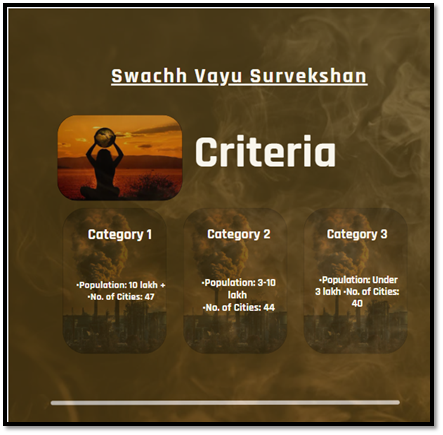
Swachh Vayu Survekshan is an initiative by the Ministry of Environment, Forest and Climate Change (MoEF&CC) to rank cities on the basis of the implementation of activities approved under the city action plan and air quality in 131 NCAP cities. Better performing cities i.e., top 3 cities in each category, are rewarded by the Ministry of Environment, Forest and Climate Change with a cash price, trophy and Certificate with the title “National Clean Air City” under National Mission for Clean Air on 7th September every year on “International day of Clean Air for Blue Skies.” All 131 cities covered under NCAP are assessed based on the ranking framework submitted by Cities/Urban Local Bodies on the PRANA portal (Dashboard to capture the progress of the NCAP programme).
The government has taken many other measures to improve air quality, increase the green cover and enhance citizens' quality of life.
- Nagar Van Yojana
The Ministry of Environment, Forest, and Climate Change has taken various initiatives through programmes and schemes to encourage tree plantation, including in urban areas. The scheme, Nagar Van Yojana (NVY), was launched in 2020 to create Nagar Vans in urban areas. This scheme promotes urban forestry by involving local communities, NGOs, educational institutions, local bodies, etc.
Nagar Van Yojana (NVY) envisages creating 1000 Nagar Vans / Nagar Vatika in Cities having Municipal Corporations, councils, Municipalities, and urban Local Bodies (ULBs) to provide wholesome, healthy living environments for residents and thus contribute to the growth of clean, green, healthy, and sustainable cities.
Under NVY, so far, 385 projects have been sanctioned in the country, since inception of the scheme in 2020.
- Ek Ped Maa Ke Naam
The government's initiative "Ek Ped Maa Ke Naam" complements the National Clean Air Mission by fostering a culture of tree plantation and environmental stewardship. By encouraging citizens to plant trees, this program not only enhances green cover but also strengthens community bonds and raises awareness about the importance of trees in combating air pollution. The dual focus on reducing emissions and increasing greenery demonstrates a holistic approach to environmental sustainability.
- Other Supportive Steps
- National Ambient Air Quality Monitoring Programme (NAMP): The Central Pollution Control Board (CPCB) has launched the National Ambient Air Quality Monitoring Programme (NAMP), utilizing a network of 804 monitoring stations to assess air quality in 344 cities and towns across 28 states and 6 union territories. This programme, established under the Air (Prevention and Control of Pollution) Act, 1981, aims to gather, compile, and distribute air quality information. It operates in collaboration with State Pollution Control Boards (SPCBs), Pollution Control Committees (PCCs), and the National Environmental Engineering Research Institute (NEERI). The collected data is sent to the CPCB for review, analysis, compilation, and publication.
- Air Quality Index: Air Quality Index has been launched for effective communication of air quality status to people in terms, which are easy to understand. It transforms complex air quality data of various pollutants into a single number (index value), nomenclature and colour. 2. There are six AQI categories, namely Good, Satisfactory, Moderately polluted, Poor, Very Poor, and Severe. Each of these categories is decided based on ambient concentration values of air pollutants and their likely health impacts (known as health breakpoints).
- Ethanol Blended Petrol (EBP) Programme: The growing concern about fuel import dependence, combined with environmental pollution issues, has driven the Government of India to promote alternative fuels that offer superior environmental benefits and are economically competitive with fossil fuels. This underscores the strategic role of biofuels in the Indian energy portfolio. These biofuels can be derived from resources such as agricultural and forest residues, municipal solid waste (MSW), and cow dung. The government has implemented the Ethanol Blended Petrol (EBP) Programme across the country, except in the Union Territories of Andaman and Nicobar Islands and Lakshadweep, where oil marketing companies sell petrol blended with 10% ethanol. This initiative aims to reduce vehicular emissions by blending ethanol with gasoline.
- The Air Quality Early Warning System: The Air Quality Early Warning System has been implemented in Delhi, Kanpur, and Lucknow to provide timely alerts and facilitate prompt action against deteriorating air quality. To address public complaints about air pollution in the Delhi NCR region, the Central Pollution Control Board (CPCB) has established multiple channels: the ‘Sameer App,’ emails at Aircomplaints.cpcb[at]gov[dot]in, and social media networks including Facebook and Twitter. These platforms ensure that concerns are efficiently received and addressed. The installation of Vapour Recovery Systems (VRS) has been mandated for petrol pumps selling more than 100 kl of gasoline per month in million-plus cities, and those selling over 300 kl per month in cities with populations between 100,000 and 1 million. Additionally, to enhance monitoring and ensure effective compliance through self-regulation, the Central Pollution Control Board (CPCB) has directed all 17 categories of highly polluting industries to install Online Continuous Emission Monitoring Systems (OCEMS). These measures aim to improve air quality management and regulatory oversight.
Conclusion
In conclusion, the Indian government's National Clean Air Mission represents a comprehensive and proactive approach to tackling the pressing issue of air pollution. By implementing stringent regulations, promoting sustainable practices, and enhancing public awareness, the initiative aims to significantly improve air quality across urban and rural areas. As India continues to face environmental challenges, the commitment to cleaner air is not just a health imperative but a crucial step toward sustainable development and improved quality of life for all citizens. Continued monitoring, innovation, and public engagement will be vital in sustaining momentum and achieving long-term air quality goals.
References
file:///C:/Users/PIB/Downloads/https___sansad.in_getFile_annex_265_AU1967_GMsSJl.pdf_source=pqars%20(1).pdf
file:///C:/Users/PIB/Downloads/https___sansad.in_getFile_annex_265_AU1170_xCbPPB.pdf_source=pqars%20(1).pdf
file:///C:/Users/PIB/Downloads/https___sansad.in_getFile_annex_265_AU374_QZYcXS.pdf_source=pqars%20(1).pdf
file:///C:/Users/PIB/Downloads/https___sansad.in_getFile_annex_265_AU369_OzNALa.pdf_source=pqars%20(1).pdf
https://pib.gov.in/Pressreleaseshare.aspx?PRID=2036732
https://prana.cpcb.gov.in/#/home
NCAP (cpcb.gov.in)
https://prana.cpcb.gov.in/assets/pdf/Swachh_Vayu_Survekshan_2023_Result.pdf
https://pib.gov.in/PressReleaseIframePage.aspx?PRID=1946406
https://cpcb.nic.in/upload/NAAQS_2019.pdf
https://pib.gov.in/Pressreleaseshare.aspx?PRID=1844628
https://mopng.gov.in/en/refining/ethanol-blended-petrol
https://cpcb.nic.in/displaypdf.php?id=bmF0aW9uYWwtYWlyLXF1YWxpdHktaW5kZXgvQWJvdXRfQVFJLnBkZg==
https://pib.gov.in/PressReleseDetailm.aspx?PRID=2030369
https://pib.gov.in/PressReleaseIframePage.aspx?PRID=2052872
https://www.unep.org/events/un-day/international-day-clean-air-blue-skies-2024
https://www.unep.org/explore-topics/air/what-we-do/clean-air-day
Click here to see in PDF:
Santosh Kumar/ Ritu Kataria/ Ishita Biswas
(Explainer ID: 153186)
आगंतुक पटल : 22152
Provide suggestions / comments